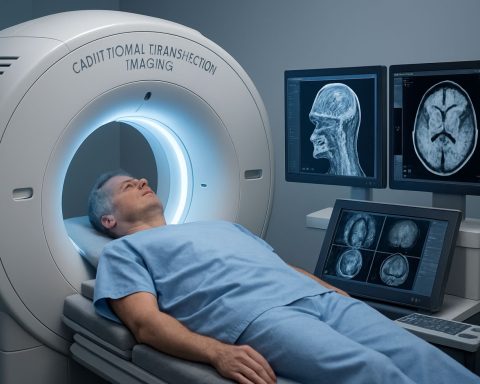- Quantum computing is evolving beyond science fiction, with key developments at events like NVIDIA GTC Quantum Day.
- The intersection of quantum mechanics and AI represents a new frontier, enhancing rather than replacing AI capabilities.
- Quantum solutions are closer than skeptics think, driven by industry leaders like D-Wave Quantum and IonQ.
- Major players like Google, Microsoft, and Amazon are advancing quantum architectures with innovations like Willow, Majorana, and Ocelot.
- Quantum’s potential impacts multiple fields, including aerospace, healthcare, and cybersecurity, with Boeing exploring quantum sensors for navigation.
- Post-quantum cryptography is crucial for future cybersecurity to counteract powerful quantum-based attacks.
- Educational programs like SandboxAQ’s scholarship drive are vital for nurturing future quantum innovators.
- The quantum and AI nexus signals a transformative era by revolutionizing industries and inspiring the next generation of technology leaders.
The cold, enigmatic world of quantum computing unfolds like a complex puzzle, promising a leap into a realm where the unimaginable becomes possible. From labs brimming with bewildering quantum devices to boardrooms where CEOs chart the future, quantum computing is no longer the stuff of science fiction. As the computing landscape evolves, the intersection of quantum mechanics and artificial intelligence (AI) emerges as the next critical frontier, one that demands not only innovation but a nuanced understanding of the science of the minuscule.
Enter the recent NVIDIA GTC Quantum Day—a vibrant stage where leaders and scientists convened to illuminate breakthroughs shimmering on the horizon. Magnificent debates ignited over quantum’s practical timelines, punctuated by the polished presentations of figures like Alan Baratz from D-Wave Quantum and Peter Chapman from IonQ. These industry titans passionately posited that quantum solutions are nearer than many skeptics suggest.
In the quantum realm, traditional bits give way to qubits, where errors must be wrangled with precision. Google’s announcement of projects like Willow highlights the race towards effective error correction—a critical component for harnessing quantum power. Meanwhile, titans like Microsoft and Amazon stride forward with their own quantum architectures, Majorana and Ocelot, propelling the industry.
Quantum’s potential, however, is not confined to computational power alone. Its impact stretches far and wide—across aerospace, healthcare, and cybersecurity. Boeing’s experiments juxtaposing quantum sensors against GPS illustrate the potential for new navigation systems impervious to jamming or interference—a crucial innovation for aviation and defense sectors.
As these developments unfurl, the concept of “Q-Day” looms—a pivotal moment when quantum computers reach maturity, calling for a paradigm shift in cybersecurity. Post-quantum cryptography emerges as an essential safeguard, adapting security protocols to withstand quantum’s brute force.
What truly sets this era apart is an unprecedented marriage of quantum and AI, where large quantitative models (LQMs) are at the nexus of revolutionizing industries. Companies like SandboxAQ are at the forefront, applying these models to uncover new materials, enhance drug discovery, and fortify asset management strategies. Their work underlines a truth: quantum isn’t supplanting AI—it’s enhancing it, creating a symbiotic relationship where AI systems with quantum capabilities could redefine what’s possible.
The future of quantum computing doesn’t rest solely with the current vanguards. A crucial component is nurturing bright minds ready to tackle qubits’ mysteries and digital challenges. SandboxAQ’s scholarship program stands as a beacon, nurturing future scientists who will drive this revolution forward—a timely reminder of the need for STEM education to fuel the next wave of quantum innovators.
Quantum computing, while still in its nascent stages, beckons with promises of transforming our digital and tangible worlds. This confluence of AI and quantum endeavor demands not only the pioneering work of today’s visionaries but an educational foundation that ensures the bright minds of tomorrow are equipped and inspired to lead. As we edge closer to the “3rd quantum revolution”, it is clear that the quantum computing frontier holds the potential to reshape industries and redefine possibilities far beyond our current imagining.
Unveiling the Future: How Quantum Computing is Poised to Transform Industries and Everyday Life
Introduction
Quantum computing stands at the crossroads of technological advancement, poised to revolutionize industries by solving problems deemed insurmountable by classical computers. As the quantum landscape evolves, it is crucial to understand its potential and the challenges it faces in reaching mainstream application.
Quantum Computing: A Deeper Dive
1. How Quantum Computers Operate:
Unlike classical computers that use bits, quantum computers utilize qubits. Qubits can exist in multiple states simultaneously, thanks to the properties of superposition and entanglement. This ability allows quantum computers to perform complex calculations much faster than their classical counterparts.
2. Error Correction in Quantum Computing:
One of the biggest challenges in quantum computing is maintaining the stability of qubits, which are prone to errors. Quantum error correction methods such as Google’s “Willow” project are crucial in preserving the integrity of information and ensuring the reliability of computations.
3. Industry Leaders and Their Contributions:
– D-Wave Quantum and IonQ are paving the way with unique quantum architectures that promise practical solutions sooner than expected.
– Microsoft and Amazon are developing Majorana and Ocelot, respectively, aiming to push quantum computing into new territories.
Real-World Applications and Industry Impact
Aerospace and Defense:
Quantum computing could redefine navigation systems. Boeing’s experiments with quantum sensors suggest potential alternatives to GPS, offering navigation systems that are resistant to interference—a significant advancement for aviation and defense.
Healthcare:
Quantum computing may expedite drug discovery by simulating molecular structures with greater accuracy, potentially leading to breakthroughs in treating diseases and personalized medicine.
Cybersecurity:
The advent of “Q-Day” refers to the time when quantum computers will be capable of breaking current encryption systems. Post-quantum cryptography is essential to protect sensitive data from such future threats.
Quantum Computing and AI: A Symbiotic Relationship
Companies like SandboxAQ are leveraging the synergy between quantum computing and AI to innovate in various fields. Quantum-enhanced AI models can significantly improve efficiency and accuracy in sectors like materials science and financial asset management.
Market Forecast and Industry Trends
According to industry projections, the quantum computing market is expected to grow exponentially in the next decade. This growth is driven by increasing investments from tech giants, startups, and governments worldwide eager to capitalize on quantum’s transformative potential.
Challenges and Controversies
Despite its promise, quantum computing faces hurdles:
– Technical Challenges: Developing stable, scalable quantum computers remains a formidable task.
– Economic Barriers: High costs of quantum technology may limit access initially to only well-funded organizations.
– Ethical Concerns: Potential decryption of private communications raises significant privacy issues.
Actionable Recommendations
1. Stay Informed: Keep abreast of developments in quantum computing and AI.
2. Invest in Education: Encourage STEM education to cultivate the next generation of quantum scientists and engineers.
3. Implement Post-Quantum Encryption: Begin exploring post-quantum cryptography to ensure cybersecurity as quantum technology advances.
Conclusion
Quantum computing is not just a revolutionary technology but an intellectual frontier that promises unprecedented change across numerous sectors. As we approach the “3rd quantum revolution,” the convergence of quantum computing and AI will likely redefine our understanding of technology itself.
Suggested Related Links











